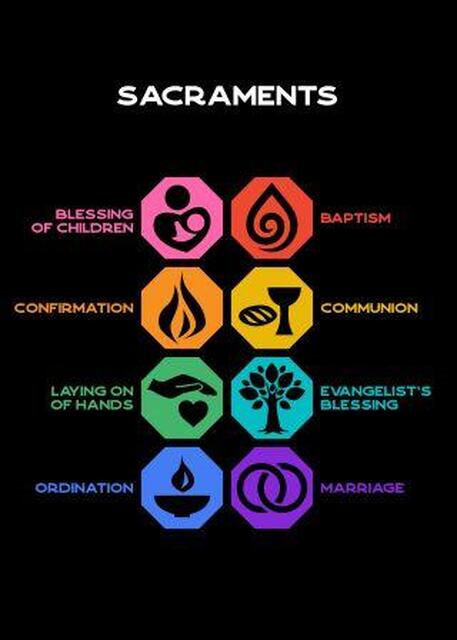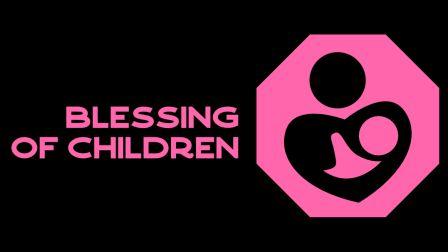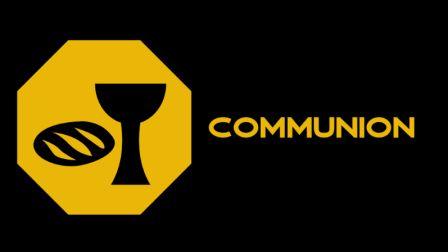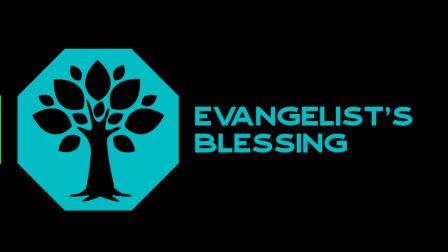Community of Christ Sacraments
|
We encounter God through the sacraments of the church, which touch lives at important times and places. Sacraments bring God’s grace, the influence of the Holy Spirit, and the example of the life of Jesus Christ together with one’s personal commitment of faith. Through the sacraments, we discover the presence of God everywhere and realize that all life is sacred. |
These encounters point to God’s loving desire to bring all people to peace, wholeness, and right relationships with one another and the Divine, which is the meaning of salvation. The sacraments refresh, renew, and challenge us to continue on Christ’s mission, our mission, for the sake of all creation.
Community of Christ has eight sacraments, most of which are celebrated in worship experiences at appropriate times. With the exception of Ordination, you do not need to be a member of Community of Christ to receive these sacraments.
Community of Christ practices full inclusion of LGBTQIA+ members and friends and full access to all the sacraments of the church including ordination and marriage.
|
Blessing of Children
A baby dedication (Blessing of Children) is a special ceremony where parents present their child to the Lord, in the presence of their congregation, and commit to raising the child in a Godly way. This ceremony is typically done in Christian churches, and is a way for parents to publicly acknowledge their responsibility to raise their child in a religious environment. The exact details of the ceremony may vary depending on the denomination and individual church.
Community of Christ believes when families bring their babies to be blessed by the elders, they are responding to God’s grace by choosing to raise their child in God’s loving community and promising to provide guidance and nurture throughout the child’s lifetime.
The congregation also commits to being a loving community in which the child can thrive and grow as a disciple of Jesus Christ.
In Community of Christ, two elders administer the blessing of children, usually during a worship service in the presence of the child’s family and the congregation. The elders hold, support, or place their hands on the child, and one elder offers a prayer of blessing. Children from newborn through age 7 may be blessed. This sacrament is available to any child regardless of the family’s membership in Community of Christ.
Community of Christ believes when families bring their babies to be blessed by the elders, they are responding to God’s grace by choosing to raise their child in God’s loving community and promising to provide guidance and nurture throughout the child’s lifetime.
The congregation also commits to being a loving community in which the child can thrive and grow as a disciple of Jesus Christ.
In Community of Christ, two elders administer the blessing of children, usually during a worship service in the presence of the child’s family and the congregation. The elders hold, support, or place their hands on the child, and one elder offers a prayer of blessing. Children from newborn through age 7 may be blessed. This sacrament is available to any child regardless of the family’s membership in Community of Christ.
Baptism
|
In baptism, we are immersed in water to symbolize death to sin and raised from the water to begin a new life. Paul, an early convert to Christianity, wrote how baptism symbolizes a complete following of Jesus and a dramatic change of life:
“When you were buried with him in baptism you were also raised with him through faith in the power of God” Colossians 2:12 NRSV |
Jesus began his work by asking to be baptized.
13 Then Jesus came from Galilee to John at the Jordan, to be baptized by him. 14 John would have prevented him, saying, "I need to be baptized by you, and do you come to me?" 15 But Jesus answered him, "Let it be so now; for it is proper for us in this way to fulfill all righteousness." Then he consented. 16 And when Jesus had been baptized, just as he came up from the water, suddenly the heavens were opened to him and he saw the Spirit of God descending like a dove and alighting on him. 17 And a voice from heaven said, "This is my Son, the Beloved, with whom I am well pleased." Matthew 3:13-17 NRSV |
Baptism is a public act announcing you are choosing to follow Jesus Christ with all of your heart, might, mind, and strength. It is a decision that marks a significant point in recognizing God’s initiative in your life, turning toward God, and entering a covenant relationship to the community of disciples and God.
People old enough to make their own decision may be baptized in Community of Christ. This is considered the age of 8 and older. Baptism represents a first step toward membership in Community of Christ.
People old enough to make their own decision may be baptized in Community of Christ. This is considered the age of 8 and older. Baptism represents a first step toward membership in Community of Christ.
If your are considering baptism, we would also recommend that you download (free) the current edition of Sharing in Community of Christ from the Community of Christ website.
This booklet explores Identity, Mission, Message, and Beliefs, of our church; and It contains church identity statements, Enduring Principles, Basic Beliefs, Mission Initiatives, and many other insights.
This booklet explores Identity, Mission, Message, and Beliefs, of our church; and It contains church identity statements, Enduring Principles, Basic Beliefs, Mission Initiatives, and many other insights.
Confirmation
|
As Jesus comes out of the water (Matthew 3:13–17), the Holy Spirit, represented as a dove, descends on him. As followers of Jesus, we are baptized of water and the Holy Spirit. Following baptism of water, new disciples take part in the sacrament of confirmation. It “confirms” membership in Community of Christ, and affirms the Holy Spirit’s continued blessing for each disciple.
|
In the sacrament of confirmation, elders place their hands on the head of the new disciple, and one elder offers a special prayer. The prayer of confirmation seeks God’s blessing to help new members grow in their covenant and generously share their giftedness in support of the church’s mission.
The commitment made through baptism and confirmation is active “discipleship expressed through covenant with God and others in sacred community” (Doctrine and Covenants 164:2d). Confirmation helps weave people into the fabric of community—both congregation and worldwide church—so they can grow in discipleship.
Communion
|
In Community of Christ, the Communion (Sacrament of the Lord's Supper) meal is shared the first Sunday of each month in the congregation and on special occasions.
All who believe in Christ, which usually is expressed in water baptism, whether members of Community of Christ or not, are welcome to share the Lord’s Supper. This is an opportunity to celebrate again our baptism and confirmation covenants, reconcile relationships, and mutually recommit to the church’s mission. It plays an important role in healing and strengthening the congregational community. Preparation should include reconciling with others, confessing our faults, and asking for and offering forgiveness. We cannot be reconciled with God if we are not reconciled with others (Matthew 5:23–24). |
Our ministers bless and serve the bread and “wine” to those gathered. Community of Christ uses grape juice rather than wine, although water may be offered for those with health concerns.
|
Laying on of Hands
|
During times of physical, mental, or emotional distress, people may seek this sacrament from ministers. This sacrament opens a way for healing in whatever form it comes.
Jesus blessed those who were hurting in many ways. The disciples anointed with oil many who were sick and healed them (Mark 6:13). We find many stories of blessing the sick in the New Testament, reflecting God’s desire for wholeness and shalom for all creation.
|
Usually two elders administer this sacrament together. They visit with the person to find out more about the person’s need. One elder places a drop of consecrated oil on the forehead of the person, places hands on the person’s head, and offers a statement of purpose and blessing. The second elder then places hands on the person’s head and offers a prayer for wholeness and well-being. This may be done privately or in the presence of family, friends, and the congregation. This sacrament is available to all seeking wholeness in body, mind, and spirit.
Evangelist's Blessing
|
Jesus prayed a special prayer for his disciples to guide them in their journey (John 17, Luke 22:31–32). Today, an evangelist blessing can be requested by individuals, couples, families, households, groups, and congregations who want to feel God’s loving grace and guidance. Time is spent in preparation through prayer, spiritual practices, study, and discernment. An evangelist or team of evangelists will guide the preparation. Once adequate preparation is completed, the evangelist(s) offers a prayer
|
This sacrament expresses the universal love of God for the recipient(s) and brings assurance, clarifies choices, and provides light for a lifetime of faithful discipleship in response to God.
Ordination
|
Jesus called people to follow him, be his disciples, and use their gifts for others (Luke 6:12–13). Some are called by God to be ordained ministers because their gifts help them serve the covenant community in specific ways.
Ordination confers authority on priesthood members according to the responsibilities of their particular priesthood offices. Priesthood members act within the guidelines and setting of the church community, upholding high standards of ministerial ethics and serving with integrity and trustworthiness.
|
Ordination recognizes the divine initiative to call certain disciples to particular priesthood responsibilities and ministries for the sake of the community, the congregation, and the world. This sacrament often is performed in a worship service. Officiating ministers, usually two, lay their hands on the person’s head. One minister offers a prayer, naming a specific priesthood office to which the person is being ordained, and may include added guidance and blessing. The congregation, representing the entire church, commits to receive the ministry that will come from the newly ordained priesthood member.
Marriage
|
Jesus Christ taught that the bond between two people who love and commit to each other in a formalized covenant is sacred (Matthew 19:4–6). He blessed marriage with his presence (John 2:1–11). Christian marriage is a sacred covenant between two people for lifelong, healthy, loving companionship. Marriage is also a legal agreement. The sacrament of marriage highlights God’s desire to strengthen and enrich the marriage.
|
A Community of Christ marriage ceremony includes a statement of mutual covenant, “‘You both mutually agree to be each other’s companion…’” (Doctrine and Covenants 111:2b), and a pronouncement prayer, “‘May God add his blessings and keep you to fulfill your covenants from henceforth and forever. Amen’” (Doctrine and Covenants 111:2d).
The couple’s agreement establishes a lifelong bond, a covenant to share Christ-like love with each other, with others, and with God.
Community of Christ priests and elders may perform this sacrament, regardless of the couple’s membership in Community of Christ, as long as local laws governing marriage are followed.
The couple’s agreement establishes a lifelong bond, a covenant to share Christ-like love with each other, with others, and with God.
Community of Christ priests and elders may perform this sacrament, regardless of the couple’s membership in Community of Christ, as long as local laws governing marriage are followed.









